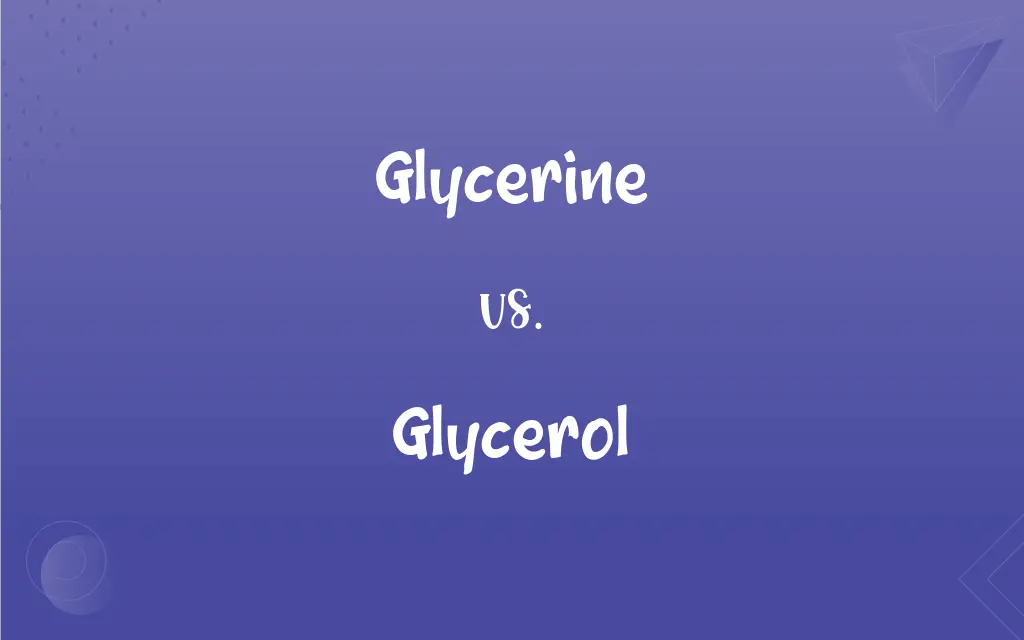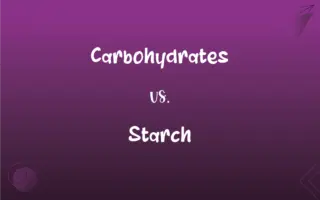Glycerine vs. Glycerol: What's the Difference?
Edited by Aimie Carlson || By Janet White || Published on January 30, 2024
Glycerine and glycerol essentially refer to the same molecule, a simple polyol compound. Glycerine is the term more commonly used in commercial and lay contexts, while glycerol is preferred in scientific and technical discussions.

Key Differences
Glycerine is often used in everyday language, especially in the context of consumer products like soaps and moisturizers. Glycerol is the term used in scientific and biochemical contexts, denoting the same chemical compound.
In the pharmaceutical and personal care industries, glycerine refers to the compound used as a humectant, sweetener, or solvent. In biochemistry, glycerol is recognized for its role in the structure of triglycerides and phospholipids.
The term glycerine is more prevalent in commercial products, suggesting a smooth, viscous, and sweet substance. Conversely, glycerol is associated with its chemical properties like its molecular formula, C₃H₈O₃, and its role in metabolic pathways.
In terms of production, glycerine can be derived from both natural sources, like vegetable oils, and petrochemical sources. Glycerol describes the same compound regardless of its source, emphasizing its consistent chemical structure and properties.
Glycerine is often used in food and beverage applications for its sweetness and moisture-retaining properties. Glycerol is studied in laboratories for its physicochemical properties and its role in biological molecules.
ADVERTISEMENT
Comparison Chart
Common Usage
Commercial and consumer products
Scientific and technical discussions
Industry Applications
Pharmaceuticals, personal care
Biochemistry, research
Contextual Implication
Smoothness, viscosity, sweetness
Chemical structure, metabolic role
Source
Natural and synthetic
Same, irrespective of the source
Role
Humectant, sweetener, solvent
Component of triglycerides, metabolic studies
ADVERTISEMENT
Glycerine and Glycerol Definitions
Glycerine
A viscous liquid used in food and cosmetics.
Glycerine is added to lotion for its moisturizing effect.
Glycerol
Integral to the formation of triglycerides and phospholipids.
Glycerol is a backbone for many fats and oils.
Glycerine
Common in skincare products.
The glycerine content in this cream prevents dry skin.
Glycerol
Studied for its physicochemical properties.
Glycerol's freezing point is a topic of research in cryobiology.
Glycerine
Derived from natural or synthetic sources.
The glycerine in this soap comes from vegetable oil.
Glycerol
A simple polyol compound, C₃H₈O₃.
Glycerol's structure makes it an important biological molecule.
Glycerine
Sweet-tasting and colorless.
Glycerine is used to sweeten cough syrup.
Glycerol
Used in scientific research and studies.
Glycerol is examined for its role in lipid metabolism.
Glycerine
Acts as a solvent and humectant.
Glycerine helps preserve moisture in baked goods.
Glycerol
Found in a variety of biological and chemical contexts.
Glycerol is a key ingredient in many laboratory experiments.
Glycerine
Glycerol or a preparation of glycerol.
Glycerol
A syrupy, sweet, colorless or yellowish liquid triol, C3H8O3, obtained from fats and oils as a byproduct of saponification and used as a solvent, antifreeze, plasticizer, and sweetener and in the manufacture of dynamite, cosmetics, liquid soaps, inks, and lubricants.
Glycerine
(organic compound) The common name for glycerol, glycerin or E422.
Glycerol
(organic compound) 1,2,3-trihydroxy-propane or propan-1,2,3-triol; a trihydric alcohol
Glycerine
A sweet syrupy trihydroxy alcohol obtained by saponification of fats and oils
Glycerol
A syrupy sweet liquid obtained as a by-product in the manufacture of soap from animal or vegetable oils and fats; it is used as an antifreeze, a plasticizer, and a food sweetener and in the manufacture of dynamite, cosmetics etc.
Glycerol
Same as Glycerin.
Glycerol
A sweet syrupy trihydroxy alcohol obtained by saponification of fats and oils
FAQs
Does glycerine have a sweet taste?
Yes, it's known for its sweetness.
Are glycerine and glycerol the same?
Yes, they refer to the same chemical compound.
Is glycerine natural or synthetic?
It can be both, depending on the source.
Can glycerine be used in food?
Yes, as a sweetener and moisture preserver.
Is glycerol only used in laboratories?
Mostly, but it's also found in various products.
Can glycerine be used in skin care?
Yes, for its moisturizing properties.
Does glycerol freeze easily?
It has a lower freezing point than water.
What is the role of glycerol in fats?
It forms the backbone of triglycerides.
Is glycerol harmful?
Generally, it's safe in normal quantities.
Is glycerine a good solvent?
Yes, it's used in pharmaceuticals and cosmetics.
Can glycerine dry out skin?
In high concentrations, it can draw moisture out.
Is glycerine safe for consumption?
In regulated amounts, it's generally safe.
Does glycerol have a color?
It's colorless.
Are there vegan sources of glycerine?
Yes, from vegetable oils and fats.
Can glycerol be used in cryopreservation?
Yes, due to its cryoprotective properties.
How is glycerol produced?
Through hydrolysis of fats and oils.
Why is glycerol important in biochemistry?
Due to its role in lipid structure and metabolism.
Is glycerol viscous?
Yes, it's a thick liquid.
Is glycerine used in baking?
Yes, to retain moisture in baked goods.
Can glycerine be used as a laxative?
Yes, in specific medicinal formulations.
About Author
Written by
Janet WhiteJanet White has been an esteemed writer and blogger for Difference Wiki. Holding a Master's degree in Science and Medical Journalism from the prestigious Boston University, she has consistently demonstrated her expertise and passion for her field. When she's not immersed in her work, Janet relishes her time exercising, delving into a good book, and cherishing moments with friends and family.
Edited by
Aimie CarlsonAimie Carlson, holding a master's degree in English literature, is a fervent English language enthusiast. She lends her writing talents to Difference Wiki, a prominent website that specializes in comparisons, offering readers insightful analyses that both captivate and inform.































































